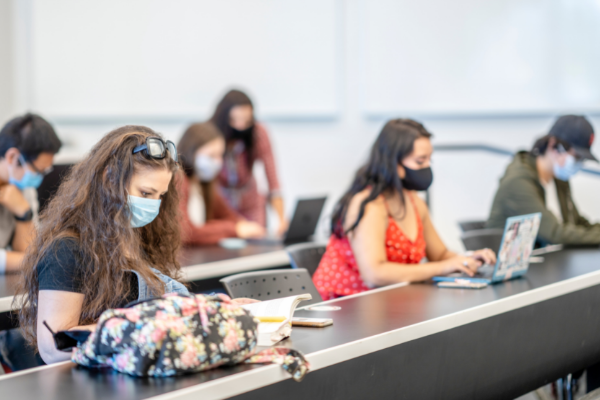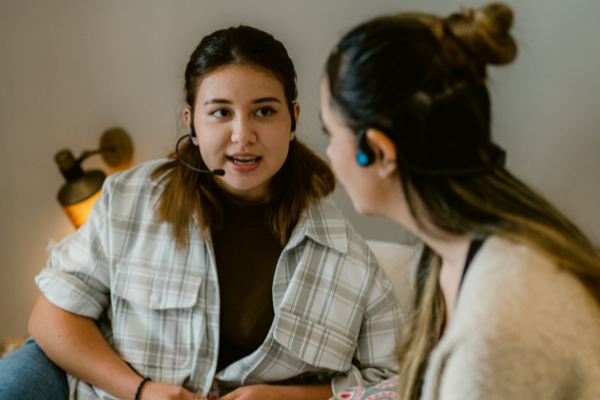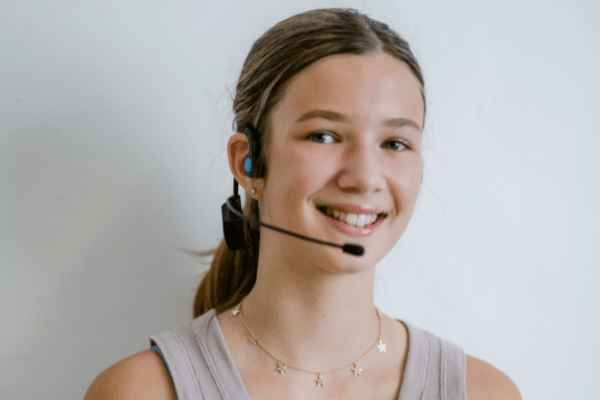With self-isolation, school closures, mask-wearing, and other restrictions in full force, young people’s development has suffered, affecting their academic achievement, mental health social skills and causing developmental delays.
“Students now risk losing $17 trillion in lifetime earnings in present value, or about 14% of today’s global GDP, because of COVID-19-related school closures and economic shocks,” says the World Economic Forum.
Now that restrictions are easing and the current academic year is coming to a close, it’s vital that we move forward, finding effective ways to address this gap and ensure students of all ages can reach their full potential.
Here at Forbrain, we can help preschoolers, school children and university students fast-track their learning, grow in self-confidence and make up for the lost time. Find out more about our revolutionary product here.
 The Global COVID-19 Education Crisis
The Global COVID-19 Education Crisis
If you’re a parent, educator, or therapist, you’ll have seen the impact that the pandemic has had on student development and likely seen motivation, social skills, and academic achievement suffer.
Disruptions
During the height of the pandemic, containing the number of new cases was paramount. This led to widespread lockdowns and school closures that kept children and young adults at home and away from learning institutions, outside activities, hobbies, and clubs, and also away from their friends and family.
Although online learning was soon adopted in many countries, the shift to the virtual world meant that children were thrown out of their daily routines and were forced to adapt to a new alternative. Many parents were also working from home, meaning that families were forced to share a restricted space and juggle the multiple responsibilities of running a household.
Children need routines to help them feel safe and develop a sense of self-discipline, so these disruptions turned their worlds upside down. They became less able to focus, more anxious, and struggled to keep up with academic demands. This too applies to university students who, despite their maturity, still need continuity and routine in order to achieve their academic potential.
Mask Wearing
Humans rely heavily on non-verbal communication and body language cues to develop their social skills, understand emotion and learn to recognize and produce sounds effectively.
However, during the height of the pandemic, this was taken away from many of us affecting young people at their most vulnerable stages of development.

“The infants born during the pandemic scored lower, on average, on tests of gross motor, fine motor and communication skills compared with those born before it (both groups were assessed by their parents using an established questionnaire),” says the scientific journal Nature, “It didn’t matter whether their birth parent had been infected with the virus or not; there seemed to be something about the environment of the pandemic itself.”
We could argue that many students spent additional time with their families during the lockdowns and period of the pandemic and would therefore still benefit from one-on-one interactions.
Yet many parents were busy with their own responsibilities, doing their best to juggle home, work, and other tasks. This meant that many children still weren’t able to benefit from the same maskless human interactions as they would in a preschool, school, college, or university setting.
Fear and Anxiety
Understandably, the pandemic placed a huge mental and emotional toll on students of all ages and their families.
These times were like nothing else this generation has experienced before and it was difficult for us all to navigate the uncertainty and fear that we or those we love could catch the virus. This was worsened further if family members or friends contracted the virus, especially if they passed away as a result.
According to Healthy Children, the percentage of emergency hospital visits for mental health rose by a shocking 24% for children aged 5-11 and 31% for older children during 2020 alone.
Lack of access to educational resources
School and university closures also pulled students away from the traditional learning environment and forced them to adapt to home learning or online school, where available.
Although many institutions made the shift to online learning early in the pandemic, there were numerous hiccups along the way.

Mistakes with content, problems with setting up educational platforms, teacher and lecturer availability, and student access all affected the quality of education available, reducing academic achievement as a result.
Children or students from lower-income families, living with disabilities or in less developed countries felt the pressure more as they were often unable to access online learning for financial reasons.
Finally, although there was some provision for preschool children and those in the early years, it was more difficult to access age-appropriate learning which should, ideally, occur in a face-to-face environment.
If these pressures occurred at a critical point in the student’s educational career such as during examination periods, the impact felt was even greater and could potentially affect their future careers and income.
The Road to Recovery
Given the circumstances, it would seem that the future is bleak for students around the world. Developmental delays, social and mental health problems, coordination issues, and failure to achieve academically can have a significant effect on a student’s future for many years to come.
However, there is hope.
 By taking control of the situation and investing more heavily in our young people by using advanced technological tools such as Forbrain, strategies that help accelerate learning and development, and supporting mental health issues, we can overcome the challenges and build back better.
By taking control of the situation and investing more heavily in our young people by using advanced technological tools such as Forbrain, strategies that help accelerate learning and development, and supporting mental health issues, we can overcome the challenges and build back better.
Here are some of the most effective ways to do this.
1. Help children transition back to school naturally
Children and young people may find the transition back to school difficult, especially when they have spent so much time in a home environment with the security and protection of their families.
But this isn’t only a problem for minors- even university students may find it hard to readjust to a new routine and experience symptoms of social anxiety or mental health issues as a result.
 Here are a few suggestions that parents and educators can use to help
Here are a few suggestions that parents and educators can use to help
- Consider how best to deal with separation anxiety
- Stay calm and make the transition as reassuring as possible
- Ensure that students have a predictable daily routine with regular times for meals, sleep and study
- Communicate closely with teachers and other parents to ensure the child’s needs are met
- Find resources that can help students become more resilient and reduce their anxiety.
- Trust in the process. Making this adjustment will naturally take time.
- Monitor the students' developmental milestones and seek help if required
- Contact a mental health professional if worried about anxiety, depression, or behavioral issues
For older students attending university, the transition should be easier although they are still likely to require additional support or access to outside resources. This could include investing in Forbrain, seeking mental health support, and leaning on the university support services where available.
2. Focus on language and communication skills
Although language and communication skills have suffered as a result of the pandemic, these can quickly be recovered or developed more rapidly with the right input. To do so, certain steps should be put into place immediately without pressuring the student to achieve too much too soon.
According to Education Week, focusing on reading skills is essential for pandemic recovery as it helps to boost a child’s vocabulary, expand their self-awareness and knowledge of the world, boost their confidence, and help them improve their verbal language skills.

Wherever possible, reading should be done aloud as it helps to activate language processing skills and verbal skills whilst also boosting comprehension. Using Forbrain can help you achieve this in just 20 minutes per day. Find out more here.
Returning to school or university itself will play a huge part in developing these, which is why it’s so essential that parents and educators ensure a smooth transition as detailed above. This allows them to spend more time in their peer group and grow their skills naturally.
Parents should also ensure that children are spending time interacting with people of all ages. This helps to expose them to the language they wouldn’t normally encounter and expand their vocabulary and social skills even further.
3. Create an education-rich home environment
A student’s home environment is key to their academic success. Therefore, parents who want to enhance their child’s success should take every step possible to ensure that the home meets their educational needs.
This can include:
- Ensuring the home is rich in all types of reaching material. Consider creating a home library, using your local public library, creating a reading nook, and reading together at bedtime.
- Create a quiet and comfortable study area for older students who have homework
- Find educational toys and resources that your child enjoys
- Offer extra support to students if required by hiring a private tutor or being there to answer their questions
- Puzzles are great brain training tools. Include as many of them as you can!
- Use Forbrain to enhance language skills and build focus and confidence
4. Protect mental health
For an individual to learn effectively and retain the information long-term, they must feel comfortable, confident, and at ease. If they struggle with mental health issues such as anxiety, fear, depression or social anxiety, they’re less likely to learn effectively and could see their problems worsen over time.
For this reason, parents and students must take mental health matters seriously and encourage the child to share how they are feeling. Only then can you offer them the support they need to overcome any mental health problems.
Make sure you foster an environment of support and love that doesn’t put too much pressure on academic achievement but takes the whole child into consideration. Recovering from the impact of the pandemic can take time, so it’s also important to be patient and take each day as it comes.
You could consider arranging some exciting activities that you can do as a family, setting them achievable goals that can help boost their confidence, and communicating closely with other members of the family and the school or university.
If extra help is required, don’t be afraid to reach out to mental health experts. They can provide the support you and your family need without judgment.
Forbrain has been designed to help support your child’s reading comprehension at every stage of their learning journey. Never has this been more important than now as we move on from the pressures of the pandemic and help students of all ages take their futures into their own hands.
Learn how you can use Forbrain here.

.png?width=1900&name=blog_banner%20(1).png)

